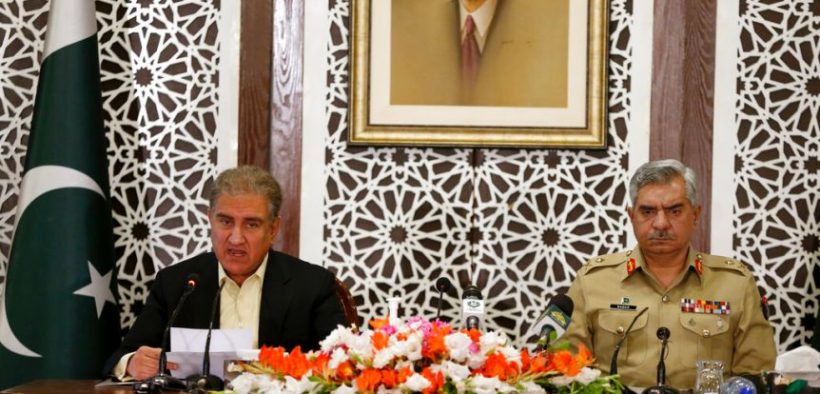Pakistan accuses arch-foe India of sponsoring terrorism from inside Afghanistan

Pakistan’s Foreign Minister Shah Mahmood Qureshi (left) partially released a dossier that claims to show India’s complicity with terror.(AP: Anjum Naveed)
Pakistani officials have alleged Indian intelligence agents are operating out of neighbouring Afghanistan to plan attacks within Pakistan, with Islamabad saying it will submit evidence of it to the United Nations.
Key points:
Nuclear-armed India and Pakistan are sworn enemies
Islamabad alleges New Delhi has sponsored terror cells which have attacked Pakistan
India has not responded to the accusations, but Pakistan says its evidence is “irrefutable”
Pakistan and India — both nuclear-armed neighbours — have accused each other of targeting the other since the countries were established following the partition of British India in 1947.
But Pakistan’s latest accusations are rare because officials are saying they have prepared a mountain of evidence to back up their allegations.
Pakistani Foreign Minister Shah Mahmood Qureshi told reporters at a press conference on Saturday local time that New Delhi was allowing its territory and that of neighbouring countries to be “used against Pakistan for terrorism”.
“We have irrefutable facts that we will present before the nation and international community through this dossier,” Mr Qureshi said.
Mr Qureshi pledged Pakistan would submit the dossier to the UN and said: “Without international intervention it is difficult to guarantee peace in nuclear South Asia.”
He has also demanded India be formally censured.
There has been no immediate comment from Indian officials to Pakistan’s allegations.
In recent years, India has likewise accused Pakistan of sponsoring militant groups that have carried out attacks inside its borders in recent years, including the group behind the deadly 2008 terror attacks in Mumbai, which killed 166 people.
Pakistan’s dossier includes alleged paper trail and audio taps
A composite image of Indian Prime Minister Narendra Modi and Pakistani Prime Minister Imran Khan.
Indian Prime Minister Narendra Modi (left) and Pakistani Prime Minister Imran Khan (right) have presided over heightened tensions between the two countries.(AP/ABC News)
Islamabad’s announcement came days after Pakistan’s said Indian military shelling killed five civilians and a soldier along the disputed border of Kashmir.
The disputed Himalayan region, which is claimed by India, Pakistan and China, has long been a source of conflict between New Delhi and Islamabad.
Major General Iftikhar, who heads the media and public relations office for Pakistan’s armed forces, presented some of the dossier’s evidence purporting to show India’s involvement in attacks within Pakistan.
This included bank receipts showing financial trails and photos showing alleged perpetrators of attacks inside the Indian consulate in Jalalabad, Afghanistan.
He also played an audio clip purporting to be of a conversation between an Indian intelligence official and Allah Nazar, who is the leader of Baluch separatist insurgents in south-west Pakistan.
India-Pakistan tensions rise
An armed soldier walks past the smoking wreckage of an aircraft as a large crown gathers around
The conflict between India and Pakistan over the disputed territory of Kashmir has escalated dramatically — and the rivals are both armed with nuclear weapons.
Read more
Mr Iftikhar added that Indian intelligence agents were also targeting Chinese development projects that had come with the China-Pakistan Economic Corridor.
Pakistan has been a major beneficiary of China’s ambitious overseas aid and trade project, known as the Belt and Road Initiative (BRI), which has seen Chinese companies invest in and build infrastructure across the country.
The military spokesman also accused India of sponsoring banned organisations including UN-designated terrorist groups Tehrik-e-Taliban Pakistan, Jamaat-ul-Ahrar, and Allah Nazar’s Baluch Liberation Army.
Afghanistan has not commented on Pakistan’s allegations and it remains unclear if they will be discussed during an official visit to Kabul by Pakistan’s Prime Minister, Imran Khan, next week.
ABC/AP











